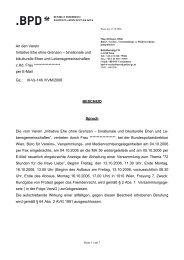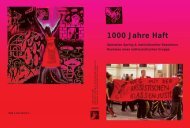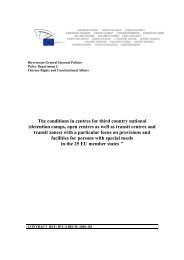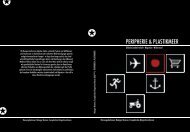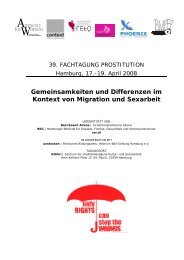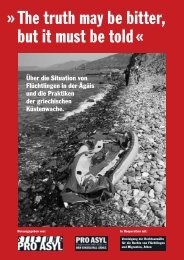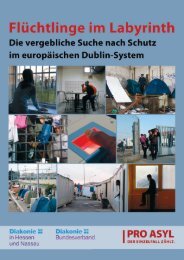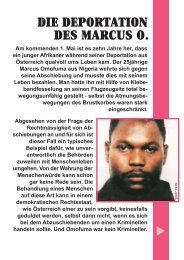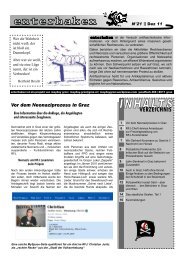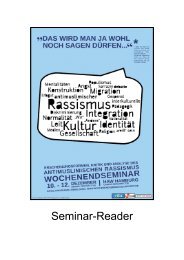Turin's CIE - International University College of Turin
Turin's CIE - International University College of Turin
Turin's CIE - International University College of Turin
Create successful ePaper yourself
Turn your PDF publications into a flip-book with our unique Google optimized e-Paper software.
87 | P a g e<br />
XIV. CLASSIFYING IDENTITY<br />
Language is a powerful tool. Italian immigration law and policy adopts rather surprising<br />
terminology to explain the condition <strong>of</strong> people whose liberty is taken away by the State because<br />
they do not have valid immigration documents. The findings from this report strongly indicate<br />
that the conditions inside <strong>Turin</strong>’s <strong>CIE</strong> might be worse than prison 196 . Yet, unlike in prison, in <strong>CIE</strong><br />
a detainee is not a “detainee” (il detenuto). Rather, the rules given to detainees in <strong>CIE</strong> describe<br />
them with the euphemism <strong>of</strong> a “guest” (l’ospite). These “guests” cannot leave at their own free<br />
will: “The greatest issue is freedom, I think that any other problem is a matter <strong>of</strong> secondary<br />
importance. People do not understand the reason why they have to throw away one year and a half<br />
<strong>of</strong> their own life inside a cage” (Interview 28). Nevertheless, the Italian legislation prescribes that<br />
they are not being “detained” but rather they are “kept” (trattenuti). The Italian legislative term<br />
trattenuto is the noun that derives from the verb “to keep” (literally, “the kept”). This process <strong>of</strong><br />
linguistic abstraction is perhaps meant to separate <strong>CIE</strong> administrative detention from criminal<br />
detention.<br />
Identity is not only classified on a linguistic level in order to separate people. Throughout the<br />
research, it became clear that there is a deeper question on how we classify identity and<br />
perhaps make decisions that deeply affect young people: “I thought my family would have helped<br />
me, while in my family I only found racists. All <strong>of</strong> them are racist. My own family. My blood. We<br />
have the same blood in our body. Why do you treat me like this? I cannot understand. I am going<br />
mad” (Interview 21). Even where there might be legal possibilities for a person to assert their<br />
identity rights, lack <strong>of</strong> access to legal aid and the emotional stress <strong>of</strong> long legal procedures can<br />
also inhibit access to justice.<br />
This Othering process is not limited to third-country nationals, since European Union citizens<br />
can end up on the wrong side <strong>of</strong> identity classification. We received reports alleging that<br />
Romanians have also been detained in <strong>Turin</strong>’s <strong>CIE</strong>: “It’s very difficult to understand why she was<br />
arrested since she was an EU citizen, I even asked the question. I was told that anyone can be inside<br />
even if they are [EU citizens], you know” (Interview 3). The practice <strong>of</strong> detaining Romanian EU<br />
citizens is not limited to <strong>Turin</strong>. According to Medici per I Diritti Umani, in 2011 a total <strong>of</strong> 304<br />
Romanians were detained in Rome’s Ponte Galeria <strong>CIE</strong> 197 . This made Romanians the third most<br />
represented nationality in Rome’s <strong>CIE</strong> 198 . Moreover, Roma gypsies who for generations have<br />
been crossing European borders can now find themselves inside <strong>CIE</strong>.<br />
One area in which young people can suffer is when they are born in Italy to immigrant parents.<br />
A person might have lived their entire life in Italy and yet they still cannot claim citizenship<br />
rights until they are eighteen years old 199 . For example, we spoke to a mother who was a longterm<br />
resident with a nine-year-old daughter who had been born in Italy. The little girl goes to<br />
school in Italy, speaks Italian as a mother tongue and knows only Italy as her local community.<br />
196 See Part B. Conditions <strong>of</strong> Detention, Chapter III. Prison and <strong>CIE</strong>.<br />
197 Medici per i Diritti Umani, Le Sbarre Più Alte, 21.<br />
198 Id.<br />
199 See Legge 5 febbraio 1992, n. 91, “Nuove norme sulla cittadinanza” (GU n. 38 del 15.2.1992). Law <strong>of</strong> 5<br />
February 1992, n. 91, “New norms on citizenship” (GU n. 38 <strong>of</strong> 15.2.1992). This law provides that in order to<br />
be an Italian citizen by birth: a person must be the child <strong>of</strong> a father or mother with Italian citizenship (article<br />
1.1.a); their citizenship must not follow that <strong>of</strong> their parents, pursuant to the law <strong>of</strong> their country (article 1.1.b);<br />
or they must be born within the Republic's territory and both parents must be either stateless or unknown (article<br />
1.2). Article 4.2 provides that “a child who is born in Italy to parents who are not Italian citizens and who has<br />
legally resided with no interruption until they turn eighteen, becomes a citizen if he declares that he wants to<br />
acquire Italian citizenship within one year” (“Lo straniero nato in Italia, che vi abbia risieduto legalmente senza<br />
interruzioni fino al raggiungimento della maggiore età, diviene cittadino si dichiara di voler acquistare la<br />
citadinanza italiana entro un anno dalla suddetta data”).




